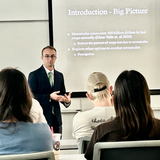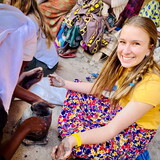"Coming into college I didn’t know much about scientific research," said senior Carlie Pickrel.
Little did she know she would spend much of her Nebraska Wesleyan undergraduate experience conducting research through Nebraska’s Idea Networks of Biomedical Research Excellence (INBRE).
The INBRE program offers university students the opportunity to explore the research field through creating and executing independent research projects. In turn participants expand their investigative abilities, uncover innovative laboratory techniques, and enhance the state’s competitiveness in biomedical research.
Students selected for the program participate in a 10-week research workshop at one of the state’s Ph.D granting institutions during the summer after their sophomore year. They spend the next two academic years implementing an independent research project.
Pickrel uncovered her interest in scientific research after her first NWU biology class.
"I love to solve mysteries which is how I view scientific research now," said the senior biology major from York, Neb.
Biology professor Jerry Bricker recognized his student's solid interest in research and encouraged her to apply to the INBRE program. She applied, was accepted, and is concluding her research this year.
Pickrel's idea for her INBRE research stemmed from her desire to help others, opting to study the Epstein-Barr Virus (EBV), an illness associated with mononucleosis.
"I was interested in researching viruses that affect humans," said Pickrel. "I was interested to learn more about the virus and the other illnesses it is associated with."
EBV is linked to many cancerous tumors including B and T lymphomas, cell malignancies, carcinomas, and chronic illnesses such as immune and lymphoproliferative syndromes—all fatal to humans. Pickrel's research on the deadly virus was intended to break ground on EBV-related cancers and illnesses by studying how EBV transforms regular cells into cancerous cells.
This summer Pickrel continued her research at the Morrison Virology Center at the University of Nebraska-Lincoln. In the lab, she studied proteins MDM2 and p53—both major contributors to the development of cancer cells. Pickrel found that cells infected with EBV have higher levels of MDM2 than those uninfected. As it turns out, the EBV infected cells contained MDM2 proteins but no p53 proteins and the illness thrived off of the MDM2 proteins and activated these to spread the illness throughout the body. Oddly, Pickrel said, MDM2 proteins require the assistance of p53 proteins to activate. Because MDM2 proteins continued to activate without the presence of p53 proteins in cells infected with EBV, Pickrel has concluded the virus is activating the MDM2 proteins alone. She has suggested that increasing p53 proteins in infected cells could be a potential method of treatment.
"If a large amount of the p53 protein were added to the cells then maybe the cancer or tumor wouldn't be formed because this protein suppresses or stops cells from rapidly replicating, but further research would need to be done to see if that would work."
Pickrel has presented her research at the annual IMBRE meeting, the Nebraska Academy of Sciences, and the West Coast Biological Science Undergraduate Conference in San Diego, Calif. — all opportunities unbeknown to her at the start of her collegiate career. Four years later, research is her passion.
Pickrel will graduate in December with plans to apply to medical school and continue her interest in research.
"This program has honestly been a life-changing experience that I will always be thankful for,” she said.
###
Story by Quinn Hullett, public relations intern











